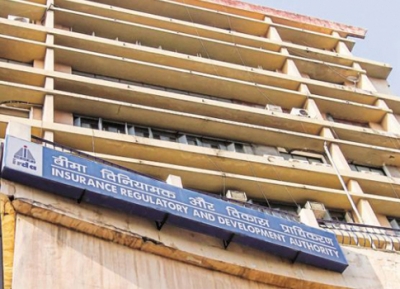By Venkatachari Jagannathan
Chennai, Feb 6 (IANS) In line with Finance Minister Nirmala Sitharaman’s budget announcement, the Insurance Regulatory and Development Authority of India (IRDAI) should set a committee of its own to review its various regulations governing the sector, said industry experts.
They also said the said committee should have representation from all the regulated entities and policyholders.
Industry officials told IANS that the Regulations Review Committee (RRC) and the various sub-groups set up by the two insurance councils — Life Insurance Council and General Insurance Council — does not have proper representation from major stakeholders.
It is also learnt the IRDAI’s Board’s sanction has not been obtained on the setting up of RRC with the officials of the insurance regulator.
The RRC was set up by the two insurance industry bodies on September 6, 2022 — based on IRDAI’s letter dated July 29, 2022.
Sitharaman presenting her budget for 2023-24 in Parliament said: “To meet the needs of Amrit Kaal and to facilitate optimum regulation in the financial sector, public consultation, as necessary and feasible, will be brought to the process of regulation-making and issuing subsidiary directions.”
Continuing further she said: “To simplify, ease and reduce cost of compliance, financial sector regulators will be requested to carry out a comprehensive review of existing regulations. For this, they will consider suggestions from public and regulated entities. Time limits to decide the applications under various regulations will also be laid down.”
Incidentally the first Chairman of the IRDAI N.Rangachary had voiced out a similar view to IANS in 2021 itself.
“It is time to do a review of IRDAI. It is more than two decades since IRDAI came into existence. As a matter of fact, every regulatory organisation should be reviewed at regular intervals,” Rangachary told IANS.
It was Rangachary who had paved the regulatory path for the sector as the first head of IRDAI.
“There should be a review committee to go into all regulatory aspects. It is time to see whether the original goal of forming the regulatory body has been fulfilled and if not, the action to be taken,” Rangachary suggested.
It should also be noted that the various regulations that were brought in when the sector was opened up has stood the test of time with no major issues plaguing the sector.
Be that as it may, industry officials told IANS that the RRC and the sub-groups set up by the two insurance councils last year suffer from some issues which need to be sorted out.
Though the Finance Minister had said the financial sector regulations would be reviewed based on suggestions from public and regulated entities, the RRC does not have any representation from the policyholders or the intermediaries like agents and brokers.
The mandate of RRC is to streamline various regulations guidelines, circulars, etc., would be required to recommend appropriate draft regulatory stipulations for the industry. The RRC has formed nine subgroups to represent various stakeholders.
“Not even once has the RRC sub-group of the intermediaries met once. The meeting has to be held fast,” K.C. Lokesh, Convenor, Confederation of General Insurance Agents Associations of India, told IANS.
He also said the main committee or the RRC does not have any representation from the 40 lakh insurance agents, which should be corrected.
Sumit Bohra, Chairman of the sub-group and President, Insurance Brokers Association of India (IBAI) told IANS, that: “There is no representation of the insurance brokers in the RRC. Further the sub-group to study the existing regulations and recommend the changes has not met even once.”
Bohra told IANS that S.N. Jayasimhan, Chief General Manager (Intermediaries), IRDAI and the Convenor of the RRC’s sub-group on the Unified Regulations for Insurance Intermediaries, had raised several issues relating to the RRC.
Replying to Bohra’s letter on the issue of not calling a meeting of the sub-group, Jayasimhan said he had flagged many regulatory concerns while going through the Order that was finalised in respect of the main RRC and various sub-groups.
A copy of the email was seen by IANS.
Jayasimhan in his reply to Bohra had said that he had shared a note on the regulatory concerns with N.S.Kannan, RRC Chairman and CEO, ICICI Prudential Life Insurance, Tapan Kumar Singhel, Co-Chair and MD & CEO, Bajaj Allianz General Insurance, Naveen Tahiliyani, Managing Director, TATA AIA Life Insurance and few others including Bohra.
“This apart, as IRDAI Legal Department was coordinating the efforts of the exercise, I had informed of the same to Mr Nithyanandam (IRDAI official) as well,” Jayasimhan’s email to Bohra notes.
“As you have desired to know the status of Sub-Group’s progress, I would like to point out that the Legal Department or none from Mr N.S. Kannan, Mr Thapan (Tapan) Singhel, Mr Navin Thaliyani (Naveen Tahiliyani), including you had provided any answer on how the issues pointed out have been addressed/resolved, to enable a coordinated approach to bring the Regulations as required,” the email adds.
Industry officials to whom IANS spoke were of the view that the issues raised by the senior IRDAI official were valid and progressive.
Interestingly, the two councils are said to be the industry’s self regulatory bodies. But they seemed to have failed to notice the regulatory violations by its members and take necessary action.
For instance, a probe by the Directorate General of Goods and Services Tax Intelligence has found several leading insurance companies of tax fraud to the tune of over Rs 820 crore — claiming input tax credit without supply of any goods and services.
Be that as it may, Jayasimhan declined to comment when contacted by IANS for clarifications on issues mentioned in the email to Bohra.
The core contention of Jayasimhan is that IRDAI cannot allow the industry bodies to frame the regulations, which the Parliament has delegated to it.
The key issues flagged by Jayasimhan are that the terms of reference of RRC do not include governance, operation process, standard operating procedure and its confirmations.
Also, it mentions non-availability of common methodology to consolidate the effort, conflict of interest in making the officers of IRDAI to work with the industry, where IRDAI is attempting to discharge its Regulatory mandate through Councils or through Insurers in RRC.
According to Jayasimhan’s mail, IRDAI officers can be just convenors to bring coordination amongst the stakeholders and not members
Further, the mail mentions that the convenors and Chairmen of sub-groups are not part of the RRC which will finally result in not having a proper coordination of sub-group efforts.
In specific, the mail points out that “Outside legal experts, who were not involved in Insurance Operations will at best be only editing the language without the knowledge of Insurance Business.
“Hence, the RRC should identify a Legal/Compliance Officer with adequate experience and exposure to Insurance Business to be involved at sub-group level, before the same is submitted to the RRC,” he had opined in his mail to Bohra.
On the contrary, the RRC has engaged a law firm to work on the regulations.
According to Jayasimhan’s email, the RRC should have a Past President of Institute of Chartered Accountant of India (ICAI) as one of its Members as Accounting and the IFRS squarely is in the territory of the ICAI and the mandate of implementing the IFRS is also with the ICAI.
Further, it is through the Past President of the ICAI, all accounting and IFRS requirements need to be frozen to make the necessary recommendations to ICAI’s President, who is a Member in the Board of IRDAI, states the email.
Meanwhile, the RRC was given two months time to submit its report when it was set up on September 6, 2022.
(Venkatachari Jagannathan can be reached at V.Jagannathan@ians.in)
–IANS
vj/dpb





